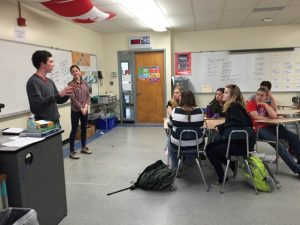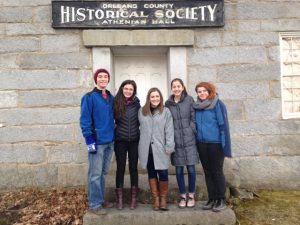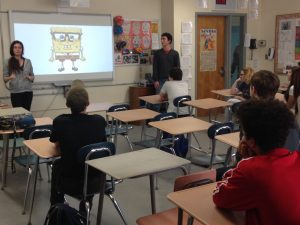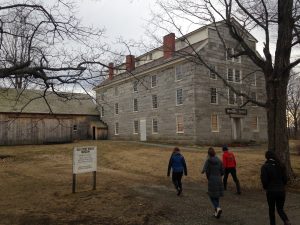Kyler Blodgett ’17 writes about his experience on a LiM-Mini-MAlt trip this spring break to Orleans County and the Northeast Kingdom of Vermont with four other Middlebury students.


“The five of us piled into the van early on the Tuesday morning of Spring Break, wondering if we had remembered all the USBs, international candies, and travel knick knacks for the next three days. We were headed 100 miles north of campus to Orleans County and the Northeast Kingdom of Vermont to deliver interactive presentations focused on global awareness and cultural relativity to students in the area. The Kingdom, as it’s called locally, is known for beautiful scenery with a low population, even relative to the rest of the state. Social services and employment options tend to be limited, but prospects of moving out of the area are low.
With this context in mind, we had spent the previous two weeks preparing our presentations. Trained by Kristen Mullins, director of the Language in Motion program on campus, we all based the presentations in our personal experiences living or studying abroad. The countries in our group included England, Ireland, France, Germany, China, and Cameroon.
As it is with many short service-learning trips, we hit the ground running. Our first afternoon in the Kingdom we presented at Brownington Central School, a K through 8 school with about 15 students per grade. There was a nervous energy among us as we met the principal and were given a tour of the small building; though many of us had worked with kids previously, the prospect of being handed the reins of a classroom either in pairs or solo was still daunting. We didn’t reconvene as a whole group until the school day ended two and a half hours later, but the nervousness had clearly vanished long before that. We shared stories of the students’ perceptiveness, and anecdotes of way the young kids focus on the most unpredictable details that is equal parts lovable and frustrating to a teacher.
Over a homemade dinner, we reflected on our gratitude that the kids were not hesitant to ask questions or show interest in the topics, a “too cool for school” feeling we had expected. We wondered if we would get such an enthusiastic reception at the neighboring Lake Region High School the next day.
 Wednesday morning had a similar feeling of anticipation since it was the fullest and least centralized day of the trip. We met with Lake Region guidance counselors before the first class, a conversation that quickly turned towards the respective stereotypes the students have of internal cliques, foreigners, and often themselves. Though this knowledge made our presentation topics feel even more relevant, it gave us a pause to consider how we’d be received.
Wednesday morning had a similar feeling of anticipation since it was the fullest and least centralized day of the trip. We met with Lake Region guidance counselors before the first class, a conversation that quickly turned towards the respective stereotypes the students have of internal cliques, foreigners, and often themselves. Though this knowledge made our presentation topics feel even more relevant, it gave us a pause to consider how we’d be received.
Much like Tuesday afternoon at the Brownington, we were collectively surprised at the level of the kids’ engagement. By second period, word had gotten around that college students were in the building and kids would often enter presentation classrooms and whisper excitedly. We saw little trace of the non-engagement counselors had warned us about; rather, students were very curious about our travels, and enthusiastic participants in simulations and discussions. In some of our most interesting moments, we were able to talk with the students about ways they thought outsiders stereotyped the Kingdom, and use that as a springboard to conversations about cultural relativity. The students brought an energy to activities that was contagious even when our own fatigue began to catch up with us in the afternoon.
Our group met up after the last bell rang with grins on our tired faces. We’d had two early mornings in a row, but the learning wasn’t done yet. We were lodging at the Old Stone House Museum not far from the schools, and the museum director gave us a tour that afternoon. She walked us through the fascinating history of the Old Stone House as a progressive boarding school run by Midd alum, Alexander Twilight, from 1829 to 1847.
Before driving back to Middlebury on Thursday, we met with the director of the Teen Center at NEKCA (the Northeast Kingdom Community Action association), a hub of local social service providers. In a conversation that was both lively and frank, director Allyson Howell talked to us about the realities of running the Teen Center on a shoestring budget, and the difficulties facing youth in the Kingdom. These included the location as a notorious drug highway from New York City to Canada, homelessness, and rural transportation obstacles.
We each reflected on the trip in different ways. For some, it confirmed that secondary education would be key to their future career path; for others, the exact opposite. For many of us, the trip raised questions about how we can engage with a new community in such a short time and allow learning about experience living in the Kingdom to supplement or contradict our background knowledge. For all of us, I think, we appreciated the chance to broaden our view of Vermont from the slice of Addison County that we see regularly. We’re extremely grateful to all the people on campus who made this trip a reality, and for the students and educators we met for their patience, enthusiasm, and willingness to share a moment of their lives with us.”

Learn more about Middlebury Alternative Breaks Trips at go/MAlt and about the Language in Motion program at go/LiM.
Alison Haas ’16, CE Communicatiosn Intern